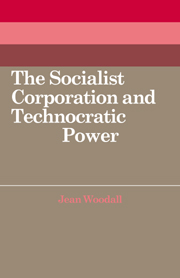 The Socialist Corporation and Technocratic Power
The Socialist Corporation and Technocratic Power Book contents
- Frontmatter
- Contents
- Preface
- List of abbreviations
- 1 Advanced industrialisation, the division of labour and the growth of bureaucratic power
- 2 The building of a socialist economy: social and political limits to growth
- 3 The emergence of a corporate structure in Polish industry, 1958–68
- 4 The emergence of a corporate structure in Polish industry, 1968–80
- 5 The political consequences of industrial integration and concentration: class, Party and management
- 6 The political consequences of industrial integration and concentration: the ‘leading role’ of the PZPR, workforce participation and socio-political reform
- 7 Summary and conclusion
- Postscript: the events of 1980
- Notes
- Bibliography
- Index
1 - Advanced industrialisation, the division of labour and the growth of bureaucratic power
Published online by Cambridge University Press: 07 October 2011
- Frontmatter
- Contents
- Preface
- List of abbreviations
- 1 Advanced industrialisation, the division of labour and the growth of bureaucratic power
- 2 The building of a socialist economy: social and political limits to growth
- 3 The emergence of a corporate structure in Polish industry, 1958–68
- 4 The emergence of a corporate structure in Polish industry, 1968–80
- 5 The political consequences of industrial integration and concentration: class, Party and management
- 6 The political consequences of industrial integration and concentration: the ‘leading role’ of the PZPR, workforce participation and socio-political reform
- 7 Summary and conclusion
- Postscript: the events of 1980
- Notes
- Bibliography
- Index
Summary
The growth in size of the Polish industrial enterprise, and the acquisition of characteristics resembling Western corporations by some levels in the industrial bureaucracy, was chosen as the subject of this work because the author considers that this posed considerable problems for control by a Marxist–Leninist party: the Polish United Workers' Party (PZPR). What would be the implications for PZPR control over management recruitment into these ‘socialist corporations’, and how does the size of these units affect the legitimacy of the PZPR in the eyes of the Polish industrial working class? More broadly this raises the question of what particular forces in the Polish industrialisation process have led to these quasicorporate structures: what are the political consequences of the pursuit of economic growth and in what manner has state bureaucratic power increased; is there an inevitable logic underlying the unfolding of the division of labour; are the ‘forces of production’ ideologically neutral? While conventional theoretical examinations of Communist polities are seen as inadequate to the task of answering these questions, the author feels that the more ‘glamorous’ theories of convergence and industrial/post-industrial society do not fit the bill much better. Rather, in the course of this chapter such ‘grand’ theory will be eschewed in favour of a more eclectic cluster of points, raised in the work of West European industrial sociologists and East European dissident intellectuals, which seem more germane to the major themes of this book.
- Type
- Chapter
- Information
- The Socialist Corporation and Technocratic PowerThe Polish United Workers' Party, Industrial Organisation and Workforce Control 1958–80, pp. 1 - 19Publisher: Cambridge University PressPrint publication year: 1982


